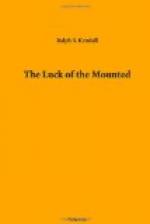Inwards, between the telephone poles, the man came stumbling along, gradually drawing nigh to the motionless watchers. Halting momentarily, during his progress he made a quick stooping action at the base of one of the poles, as if with vague purpose, which action was remarked at least by Redmond.
Then, for the first time, he seemed to become aware of their presence, and making a pitiful attempt to dissemble his condition and assume a smart, erect military carriage he waved his riding-crop at them by way of salutation. Something in his action, its graceful, airy mockery, trivial though it was, impressed the gestures firmly in Redmond’s mind. He became cognizant of a flushed, undeniably handsome face with reckless eyes and mocking lips; a slimly-built figure of a man of medium height, whose natural grace was barely concealed by the short regimental fur coat.
Halting unsteadily within the regulation three paces pending salute, he struck an attitude commonly affected by Mr. Sothern, in “Lord Dundreary,” and jauntily twirled his crop, the while he declaimed:—
“Waltz me round again, Willie,
Willie,
Round and round and—”
“Round!” finished Slavin, with a horrible oath. There seemed something shockingly aboriginal—simian—in the swift, gorilla-like clutch of his huge dangling hands, as they fastened on the throat and shoulder of the drunken man and whirled him on his back in the snow—something deadly and menacing in his hard-breathing, soft-brogued invective:
“Yeh bloody nightingale! come off th’ perch! . . . I’m fed up wid yeh!—I’ll waltz yeh!—I’ll tache yeh tu make a mock av Burke Slavin, time an’ again! I’ll—”
Redmond interposed, “Steady, Sergeant!” he implored shakily, his hand on his superior’s shoulder, “For God’s sake—”
But Slavin, in absent fashion, shoved him off. He seemed to put no effort in the movement, but the tense muscular impact of it sent Redmond reeling yards away.
“Giddap, Yorkey! God d——n ye for a dhrunken waster!—giddap! or I’ll put th’ boots tu yeh!” Terrible was the menace of the giant Irishman’s face, his back-flung boot and his snarling, curiously low-pitched voice.
“No! not Burke, old man! . . . ah, don’t!” gasped the rich tenor voice pleadingly from the snow—“ah, don’t, Burke! . . . remember, remember . . . St. Agnes’ Eve—
“St. Agnes’ Eve. Ah!
bitter chill it was,
The—”
It broke—that throbbing voice with its strange, impassioned appeal. Far away over the snow the faint, silvery ring of a locomotive gong fell upon the ears of the trio almost like the deep, solemn tolling of bells.
Then slowly, and seemingly in pain, the prostrate man arose.
And yet! Redmond mused, sorry a figure as he cut just then, minus fur-cap and plastered with snow, alone with the shame which was his, he had an air, a certain dignity of mien, this man, Yorke, which stamped him far above the common run of men.




